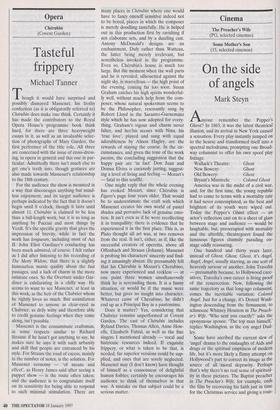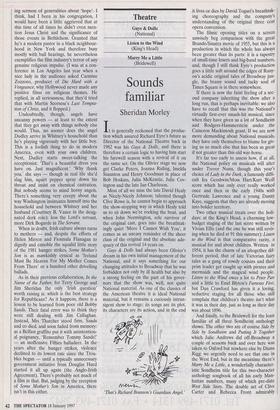Cinema
The Preacher's Wife (PG, selected cinemas)
Some Mother's Son (15, selected cinemas)
On the side of angels
Mark Steyn
Aiyone remember the Pepper's Ghost? In 1863, it was the latest theatrical illusion, and its arrival in New York caused a sensation. Every play instantly jumped on to the hearse and transformed itself into a spectral melodrama, prompting one Broad- way columnist to offer his own spoof play listings: Wallack's Theatre: Ghost New Bowery: Ghost Old Bowery: Ghost Bryant's Minstrels: Colored Ghost America was in the midst of a civil war, and, for the first time, the young republic had to come to terms with a mortality rate it had never contemplated, as the best and brightest of its youth were wiped out. Today the Pepper's Ghost effect — an actor's reflection cast on to a sheet of glass between stage and audience — would be laughable, but, preoccupied with mortality and the afterlife, theatregoers found the luminous figures clumsily parading on- stage oddly reassuring.
One hundred and thirty years later, instead of Ghost, Ghost, Ghost, it's Angel, Angels Angel, usually starring, as one sort of heavenly saviour or another, John Travolta — presumably because, to Hollywood exec- utives, Travolta's own career is living proof of the resurrection. Now, following the same trajectory as that long-ago columnist, comes the inevitable variation: Colored Angel. Just for a change, it's Denzel Wash- ington descending from the firmament, to schmooze Whitney Houston in The Preach- er's Wife. 'Who sent you exactly?' asks the eponymous spouse. 'The top man himself,' replies Washington, as the coy angel Dud- ley.
Some have ascribed the current slew of `angel' drama to the onslaughts of Aids and drugs or the spiritual emptiness of modern life, but it's more likely a flimsy attempt on Hollywood's part to correct its image as the source of all -moral depravity. Perhaps that's why there's no real sense of spiritual- ity in these pictures. The Baptist preacher in The Preacher's Wife, for example, ends the film by recovering his faith just in time for the Christmas service and giving a rous- ing sermon of generalities about 'hope'. I think, had I been in his congregation, I would have been a little aggrieved that at this time of all times he didn't even men- tion Jesus Christ and the significance of those events in Bethlehem. Granted that he's a modern pastor in a black neighbour- hood in New York and therefore busy mostly with bail hearings, he nevertheless exemplifies the film industry's terror of any genuine religious impulse. (I was at a con- ference in Los Angeles last year when a nice lady in the audience asked Carmine Zozzoro, producer of Die Hard with a Vengeance, why Hollywood never made any positive films on religious themes. He replied, in all seriousness, that they'd tried that with Martin Scorsese's Last Tempta- tion of Christ, and it flopped.) Undoubtedly, though, angels have uncanny powers — at least to the extent that they get away with things nobody else would. Thus, no sooner does the angel Dudley arrive in Whitney's household than he's playing vigorously with her little boy. This is a foolish thing to do in modern America, even with your own children. Next, Dudley starts sweet-talking the receptionist: 'That's a beautiful dress you have on. Just magnificent.' Why thank you,' she says — though in real life she'd slug him, squirt pepper spray down his throat and insist on chemical castration. But nobody seems to mind horny angels. There's something very creepy about the way Washington insinuates himself into the household and between Whitney and her husband (Courtney B. Vance in the desig- nated dark role): less the Lord's servant, more Dirk Bogarde in The Servant.
When in doubt, Irish culture always turns to mothers — and, despite the efforts of Helen Mirren and Fionnula Flanagan to dignify and ennoble the squalid little story of the 1981 hunger strikes, Some Mother's Son is as mawkishly cynical as 'Ireland Must Be Heaven For My Mother Comes From There' or a hundred other drivelling ballads.
As in their previous collaboration, In the Name of the Father, for Terry George and Jim Sheridan the only 'Irish question' worth raising is: which is the best strategy for Republicans? As it happens, there is a lesson to be learned from poor old Bobby Sands. Their fatal error was to think they were still dealing with Jim Callaghan. Instead, Mrs Thatcher stood firm, Sands and co died, and soon faded from memory: as a Belfast graffito put it with unintention- al poignancy, 'Remember Tommy Sands!' — an inoffensive Fifties balladeer. In the years after the hunger strikes, violence declined to its lowest rate since the Trou- bles began — until a typically unnecessary government initiative from Douglas Hurd started it all up again (the Anglo-Irish Agreement). There's probably not much of a film in that. But, judging by the reception of Some Mother's Son in America, there isn't in this either.



























































 Previous page
Previous page